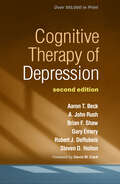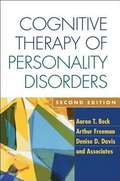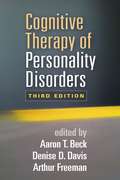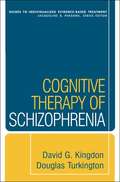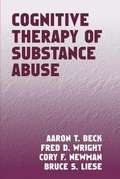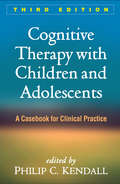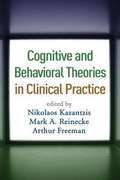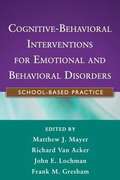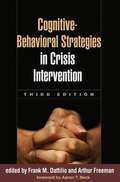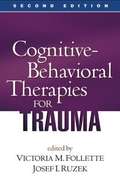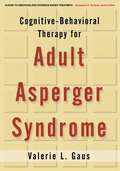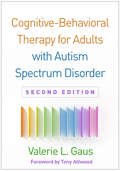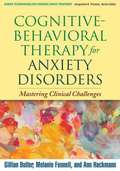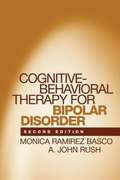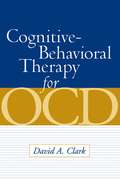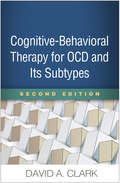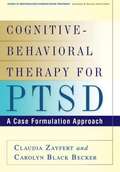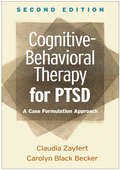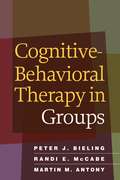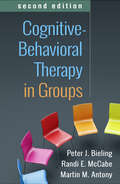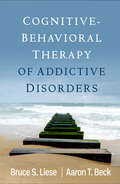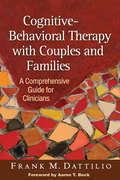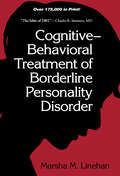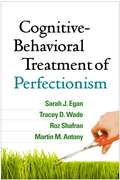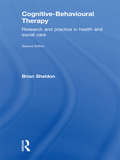- Table View
- List View
Cognitive Therapy of Depression
by Aaron T. Beck Brian F. Shaw A. John Rush Gary Emery Steven D. Hollon Robert J. DeRubeisReflecting major contemporary developments in theory and clinical practice, the second edition of this authoritative guide has been significantly rewritten with 85% new material. Cognitive therapy (CT) pioneer Aaron T. Beck and associates provide cutting-edge knowledge about the cognitive model of depression and the most effective, lasting ways to reduce clients' suffering. The volume links clearly explained theoretical principles to specific therapeutic strategies. Techniques for identifying, examining, and changing the thoughts, beliefs, and behaviors that give rise to depression and related disorders are illustrated with compelling vignettes and sample dialogues. New to This Edition *Reflects the maturation of CT for treating more complicated presentations, including patients with chronic depression or underlying personality disorders. *Brings therapists up to date on schema-focused approaches as well as classic cognitive and behavioral interventions. *Incorporates data from basic research and many dozens of clinical trials. *All-new vignettes and a chapter-length case example. *Greater attention to the therapeutic relationship and to longer-term treatment.
Cognitive Therapy of Personality Disorders, Second Edition
by Aaron Beck Arthur FreemanThis landmark work was the first to present a cognitive framework for understanding and treating personality disorders. Part I lays out the conceptual, empirical, and clinical foundations of effective work with this highly challenging population, reviews cognitive aspects of Axis II disorders, and delineates general treatment principles. In Part II, chapters detail the process of cognitive-behavioral therapy for each of the specific disorders, review the clinical literature, guide the therapist through diagnosis and case conceptualization, and demonstrate the nuts and bolts of cognitive intervention. New to This Edition Over a decade's worth of tremendous advances in theory and practice. Chapters covering assessment procedures and issues in the therapeutic relationship, including a wealth of information on therapeutic impasses and how to overcome them. Restructured to follow a consistent format. Expanded case material.
Cognitive Therapy of Personality Disorders, Third Edition
by Aaron T. Beck Denise D. Davis Edd Arthur FreemanThis widely used practitioner resource and training tool is the definitive work on understanding and treating personality disorders from a cognitive-behavioral therapy (CBT) perspective. The prominent editors and contributors explain the nature of personality disorders and why they are so challenging to treat. Chapters addressing 12 specific disorders are organized around vivid, instructive clinical examples. The book provides up-to-date scientific knowledge about each disorder and describes effective strategies for differential diagnosis, case conceptualization, implementing individualized CBT interventions, and overcoming roadblocks. New to This Edition *Incorporates cutting-edge clinical approaches and research; expands the cognitive theory of personality disorder. *Chapters on neural mechanisms, cultural diversity issues, and depressive personality disorder. *Chapters on co-occurring disorders and management of clinical challenges. *Disorder-specific chapters now include sections on key treatment goals, progress and termination, and clinician self-care. *Discusses DSM-5 concepts and diagnostic criteria. *Reviews advances in assessing personality beliefs.
Cognitive Therapy of Schizophrenia
by David Kingdon Douglas TurkingtonDrawing on the authors' decades of influential work in the field, this highly practical volume presents an evidence-based cognitive therapy approach for clients with schizophrenia. Guidelines are provided for collaborative assessment and case formulation that enable the clinician to build a strong therapeutic relationship, establish reasonable goals, and tailor treatment to each client's needs. Described in thorough, step-by-step detail are effective techniques for working with delusional beliefs, voices, visions, thought disorders, and negative symptoms; integrating cognitive therapy with other forms of treatment; reducing relapse risks; and enhancing client motivation. Special features include reproducible client handouts and assessment tools.
Cognitive Therapy of Substance Abuse
by Aaron T. Beck Fred D. WrightCognitive therapy offers a well-documented and cost-effective psychosocial treatment model for working with substance abuse disorders. Comprehensive and accessible, this volume clearly details the cognitive model of addiction, the specifics of case formulation, management of the therapeutic relationship, and the structure of the therapy sessions. It discusses how to educate patients in the treatment model and procedures and manage their cravings and urges for drugs and alcohol. Specific cognitive and behavioral strategies and techniques are described in detail, as are methods for understanding and working with patients who present concomitant problems of depression, anxiety, low frustration tolerance, anger, and personality disorders. Also addressed are such significant issues as crisis management and relapse prevention. Enhancing the utility of the volume are appendices featuring sample client inventories and checklists. These forms are designed to help the clinician identify targets for intervention, track progress over time, and develop an individualized relapse prevention plan for each client.
Cognitive Therapy with Children and Adolescents, Third Edition: A Casebook for Clinical Practice
by Philip C. KendallThousands of clinicians and students have turned to this casebook--now completely revised with 90% new material--to see what cognitive-behavioral therapy (CBT) looks like in action with the most frequently encountered child and adolescent disorders. Concise and accessible, the book is designed for optimal clinical utility. Leading scientist-practitioners provide a brief overview of each clinical problem and its assessment and management. Chapters are organized around one or more detailed case examples that demonstrate how to build rapport with children and families; plan effective, age-appropriate treatment; and deliver evidence-based interventions using a variety of therapeutic strategies and materials. (Prior edition editors: Mark A. Reinecke, Frank M. Dattilio, and Arthur Freeman.) New to This Edition *Most chapters are new, reflecting nearly 15 years of advances in theory and research. *Additional chapter topics: generalized anxiety disorder and family-based treatment of adolescent substance abuse. *Streamlined, more concise format makes the book even more user friendly for busy clinicians. *Increased attention to cultural considerations and transdiagnostic treatment strategies.
Cognitive and Behavioral Theories in Clinical Practice
by Mark Reinecke Nikolaos KazantzisDemonstrating the importance of theory for effective clinical practice, this thought-provoking volume brings together leading experts on a range of contemporary cognitive and behavioral approaches. The contributors probe the philosophical and theoretical underpinnings of each model its assumptions about normal psychological processes, the development and maintenance of psychopathology, and the mechanisms by which therapeutic changes take place. The historical antecedents of the theories are examined and studies that have tested them are reviewed. Vivid case studies show practitioners how theory informs clinical decision making and technique in each of the respective approaches.
Cognitive-Behavioral Interventions for Emotional and Behavioral Disorders
by Matthew Mayer Richard Van AckerEvidence based and practical, this book presents state-of-the-science approaches for helping K-12 students who struggle with aggressive behaviors, anxiety, depression, ADHD, and autism. It explains the fundamentals of cognitive-behavioral intervention and reviews exemplary programs that offer powerful ways to reach at-risk children and adolescents. Leading authorities thoroughly describe the process of assessment, treatment planning, implementation, and program evaluation. What makes the book unique is its focus on the nitty-gritty of school-based intervention, including how to integrate mental health services into the special education system, overcome obstacles, and provide needed skills to school personnel.
Cognitive-Behavioral Strategies in Crisis Intervention, Third Edition
by Frank Dattilio Arthur FreemanThis invaluable practitioner guide and text shows how cognitive-behavioral interventions can help people weather situations of extreme stress and build needed skills for the future. Leading authorities describe effective, time-efficient approaches to managing different types of crises those related to particular psychological problems, such as panic disorder, suicidal depression, and personality disorders; medical crises; child and family crises; and environmental and situational crises, including large-scale traumatic events. Vivid case material illustrates what the interventions look like in action and how to tailor them to individual clients' needs. New to This Edition Incorporates new empirical data and clinical innovations. Chapters addressing clinical decision making, treating law enforcement personnel, traumatic stress syndromes, and applications for working with chronic pain sufferers, aggressive youths, and victims of terrorism.
Cognitive-Behavioral Therapies for Trauma, Second Edition
by Josef Ruzek Victoria FolletteThis volume presents cutting-edge cognitive and behavioral applications for understanding and treating trauma-related problems in virtually any clinical setting. Leading scientist-practitioners succinctly review the "whys," "whats," and "hows" of their respective approaches. Encompassing individual, group, couple, and parent-child treatments, the volume goes beyond the traditionally identified diagnosis of PTSD to include strategies for addressing comorbid substance abuse, traumatic revictimization, complicated grief, acute stress disorder, and more. It also offers crucial guidance on assessment, case conceptualization, and treatment planning.
Cognitive-Behavioral Therapy for Adult Asperger Syndrome
by Valerie Gaus Gary MesibovAn invaluable resource for therapists, this lucidly written book provides research-based strategies for addressing the core problems of Asperger syndrome (AS) and helping clients manage frequently encountered comorbidities, such as anxiety disorders and depression. Detailed case examples illustrate the complexities of AS and the challenges it presents in daily life, relationships, and the workplace. The author presents a cogent rationale for cognitive-behavioral intervention and offers clear guidelines for conducting assessments and designing and implementing individualized treatment plans. Throughout, the emphasis is on helping people with AS decrease distress while preserving and building on their unique strengths. Special features include a case formulation worksheet and other helpful reproducibles.
Cognitive-Behavioral Therapy for Adults with Autism Spectrum Disorder, Second Edition
by Tony Attwood Valerie L. GausNow revised and expanded, this is the leading resource for psychotherapists working with adults who have autism spectrum disorder (ASD) without significant cognitive and language impairments (also known as Asperger syndrome). Valerie L. Gaus shows how to adapt the proven techniques of cognitive-behavioral therapy (CBT) to build clients' social and coping skills, facilitate self-acceptance, and treat comorbid anxiety and depression. Illustrated with detailed case examples, the book is grounded in cutting-edge knowledge about information-processing differences in ASD. It gives clinicians critical guidance for conceptualizing these clients' presenting problems and optimizing the effectiveness of interventions. Reproducible worksheets can be downloaded and printed in a convenient 8 1/2" x 11" size. First edition title: Cognitive-Behavioral Therapy for Adult Asperger Syndrome. New to This Edition *Explains the significant terminology changes in DSM-5 and their impact. *Chapter on mindfulness-based strategies for emotion regulation problems. *Additional strategies and resources for teaching social and coping skills. *Describes new and updated assessment instruments. *Incorporates cutting-edge research on CBT and on clinical problems associated with ASD. See also the author's related self-help resource, Living Well on the Spectrum, an ideal client recommendation.
Cognitive-Behavioral Therapy for Anxiety Disorders
by Gillian Butler Melanie FennellHelping therapists bring about enduring change when treating clients with any anxiety disorder, this invaluable book combines expert guidance, in-depth exploration, and innovative clinical strategies. The authors draw on extensive experience and research to provide a framework for constructing lucid formulations of complex cases. They identify obstacles that frequently arise during the early, middle, and later stages of treatment and present a wide range of practical solutions. The volume demonstrates clear-cut yet flexible ways to enhance client engagement, foster metacognitive awareness, facilitate emotional processing, address low self-esteem and fear of uncertainty, and much more. Reproducible handouts and forms are included.
Cognitive-Behavioral Therapy for Bipolar Disorder, Second Edition
by Monica Basco A. RushFrom leading scientist-practitioners, this pragmatic, accessible book provides a complete framework for individualized assessment and treatment of bipolar disorder. It addresses the complexities of working with individuals with broadly varying histories and clinical presentations, including those who have been recently diagnosed, those who are symptomatically stable, and those who struggle day to day to achieve symptom remission. Extensive case material illustrates proven strategies for conceptualizing patients' needs and working collaboratively to help them adhere to medication treatments, recognize the early warning signs of manic and depressive episodes, build coping skills, and manage specific symptoms. The second edition is a complete revision of the original volume, updated and restructured to be even more user friendly for clinicians.
Cognitive-Behavioral Therapy for OCD
by David A. ClarkThis authoritative book reviews current cognitive-behavioral models of OCD and delineates an innovative, theoretically and empirically grounded approach to assessment and treatment. Leading scientist-practitioner David A. Clark first elaborates and refines existing theories of obsessions and compulsions. He then spells out effective strategies for assessing client needs, developing a clear case formulation, implementing an array of cognitive and behavioral interventions, and troubleshooting potential difficulties. Illustrated with extensive clinical material, the volume is practical and user-friendly. Reproducible appendices feature over a dozen rating scales, client handouts, and homework tasks.
Cognitive-Behavioral Therapy for OCD and Its Subtypes, Second Edition
by David A. ClarkNow significantly revised with 80% new content, this authoritative guide synthesizes the latest knowledge on obsessive–compulsive disorder (OCD) and its treatment. Prominent clinician-researcher David A. Clark describes the "whats," "whys," and "how-tos" of CBT for a broad range of obsessions and compulsions. Combining scientific rigor and clinical acumen, the book illustrates an effective approach to assessment, case formulation, psychoeducation, and cognitive and behavioral intervention. It includes 26 reproducible forms and handouts; purchasers get access to a Web page where they can download and print the reproducible materials in a convenient 8 1/2" x 11" size. First edition title: Cognitive-Behavioral Therapy for OCD. New to This Edition *Reflects more than 15 years of major advances in clinical practice, theory, and research. *Chapters on specific OCD subtypes: contamination, doubt and repeated checking, repugnant obsessions, and symmetry/order. *Heightened clinical utility--includes more case vignettes and step-by-step procedures. *Describes important refinements to exposure and response prevention, based on inhibitory learning. *Reproducible materials now available online.
Cognitive-Behavioral Therapy for PTSD
by Carolyn Becker Claudia ZayfertPresenting clear-cut strategies for working with traumatized patients who have multiple co-occurring disorders and life problems, this highly practical manual puts an array of proven cognitive-behavioral strategies at the clinician's fingertips. The authors illustrate the "whats," "whys," and "how-tos" of exposure, cognitive restructuring, and other effective techniques for treating posttraumatic stress disorder (PTSD), and show how to organize interventions within a systematic yet flexible case formulation. Throughout, detailed clinical material shows exactly what the process of therapy looks like and offers guidance for overcoming treatment hurdles. More than 20 reproducible clinical tools are included.
Cognitive-Behavioral Therapy for PTSD, Second Edition: A Case Formulation Approach
by Claudia Zayfert Carolyn Black BeckerAcclaimed for providing a flexible framework for individualized treatment of posttraumatic stress disorder (PTSD), this empathic guide has now been revised and expanded with 50% new material. The authors show how the case formulation approach enables the practitioner to adapt CBT for clients with different trauma histories, co-occurring problems, and complicating life circumstances. Vivid clinical material illustrates the implementation of exposure therapy, cognitive restructuring, and supplemental interventions, with ample attention to overcoming common obstacles. Purchasers get access to a Web page where they can download and print the book's 22 reproducible handouts in a convenient 8 1/2" x 11" size. New to This Edition *Chapters on evidence-based practice and emotion regulation. *Significantly revised chapter on supplemental treatment tools, with new discussion of anger management. *Advances in theory and practice of exposure therapy. *Increased attention to multicultural issues in treatment. *Updated throughout with current treatment research and DSM-5 diagnostic changes.
Cognitive-Behavioral Therapy in Groups
by Peter J. Bieling Martin M. Antony Randi E. MccabeAn authoritative practitioner guide and student text, this book offers clear advice on how to structure and lead cognitive-behavioral therapy (CBT) groups and overcome common challenges that arise. Specific, evidence-based group assessment and treatment protocols are provided for a range of frequently encountered disorders. Emphasizing that a CBT group is more than the sum of its individual members, the authors show how to understand and use group process to optimize outcomes. Up to date, accessible, and highly practical, the book is filled with session outlines, sample dialogues, checklists, troubleshooting tips, and other user-friendly features.
Cognitive-Behavioral Therapy in Groups, Second Edition
by Peter J. Bieling Martin M. Antony Randi E. McCabeThe leading guide to group-based cognitive-behavioral therapy (CBT) has now been significantly revised with 70% new material, reflecting over 15 years of research and clinical advances. Too often, CBT training resources treat groups as simply an extension of individual therapy. Filling an important need, this text helps students and practitioners build essential skills for leveraging group process to optimize outcomes. Featuring sample dialogues, clinical pointers, and troubleshooting tips, the book provides practical answers to group leaders' most pressing questions. Effective protocols for treating specific disorders are presented, with a focus on CBT techniques and group process factors unique to each type of group. New to This Edition *Chapters on inpatient groups and mindfulness-based CBT. *Chapters on additional disorders: posttraumatic stress disorder and borderline personality disorder. *Fully rewritten chapters on anxiety disorders, substance use disorders, and psychosis. *Discussions of timely topics, such as conducting virtual groups and the growth of transdiagnostic approaches. *Even more clinician friendly; streamlined chapters highlight "what to do when."
Cognitive-Behavioral Therapy of Addictive Disorders
by Aaron T. Beck Bruce S. LieseGrounded in decades of CBT research and clinical practice, as well as cutting-edge cognitive science, this book provides critical tools for understanding and treating the full range of addictive behaviors. Bruce S. Liese and Aaron T. Beck explain how to systematically develop case conceptualizations and support clients in achieving their recovery goals. The authors use vivid case examples to illustrate CBT techniques, structure, psychoeducation, motivational interviewing, group treatment, relapse prevention, and other effective therapeutic components. Several reproducible forms can be downloaded and printed in a convenient 8 1/2" x 11" size. Reflecting nearly 30 years of important advances in the field, this entirely new book replaces the authors' classic Cognitive Therapy of Substance Abuse.
Cognitive-Behavioral Therapy with Couples and Families: A Comprehensive Guide for Clinicians
by Frank DattilioFrom a leading expert in cognitive-behavioral therapy and couple and family therapy, this comprehensive guide combines cutting-edge research and clinical wisdom. The author shows how therapeutic techniques originally designed for individuals have been successfully adapted for use with couples and families struggling with a wide range of relationship problems and stressful life transitions. Vivid clinical examples illustrate the process of conducting thorough assessments, implementing carefully planned cognitive and behavioral interventions, and overcoming roadblocks. The book highlights ways to enhance treatment by drawing on the latest knowledge about relationship dynamics, attachment, and neurobiology. Cultural diversity issues are woven throughout.
Cognitive-Behavioral Treatment of Borderline Personality Disorder
by Marsha LinehanThis volume is the authoritative presentation of Dialectical Behavior Therapy (DBT), Linehan's comprehensive, integrated approach to treating individuals with borderline personality disorder. DBT--which has since been adapted for other difficult-to-treat disorders involving emotion dysregulation--combines cognitive and behavioral strategies with elements of psychodynamic, strategic, and other modalities. Delineated are specific strategies for contingency management, exposure, cognitive modification, and skills training. In-depth descriptions of skills training procedures are provided in the companion manual. Core emotion regulation skills are also taught directly to clients in Linehan's skills training videos.
Cognitive-Behavioral Treatment of Perfectionism
by Martin M. Antony Roz Shafran Tracey D. Wade Sarah J. EganThis practical resource provides an evidence-based framework for treating clients struggling with perfectionism, whether as the main presenting problem or in conjunction with depression, eating disorders, anxiety disorders, or obsessive-compulsive disorder. Using a case formulation approach, the authors draw on their extensive cognitive-behavioral therapy (CBT) experience to present specific techniques and interventions. Coverage spans treatment planning, the therapeutic alliance, key obstacles that may arise, relapse prevention, and emerging research. Reproducible assessment scales and 36 patient handouts are included; purchasers get access to a Web page where they can download and print the reproducible materials in a convenient 8 1/2" x 11" size.
Cognitive-Behavioural Therapy: Research and Practice in Health and Social Care
by Brian SheldonCognitive-behavioural therapy (CBT) has been extensively researched and shown to be solidly underpinned by evidence. Broadly applicable across a wide range of personal and social problems – from depression and phobias to child behavioural problems – it is only now beginning to be used to its full potential in health and social care practice. This second edition of Cognitive-Behavioural Therapy is comprehensively revised and updated. It takes into account the significant amount of new research in the discipline, and integrates theory, research and practice. The text includes plentiful case studies from across health and social care to illustrate particular approaches, different problems and different professional circumstances. Topics covered include: a discussion of the development and distinctive features of CBT; a comprehensive review of research on learning and cognition, examining the therapeutic implications of these studies; a thorough guide to assessment and therapeutic procedures, including methods of evaluation; illustrations of the main methods of helping with case examples from social work, nursing and psychotherapy; consideration of the ethical implications of such methods as part of mainstream practice. Cognitive-Behavioural Therapy is written in a lively and accessible style, and is designed to give a thorough grounding in cognitive-behavioural methods and their application. It is essential reading for students and professionals in psychology, social work, psychiatric nursing and psychotherapy.
